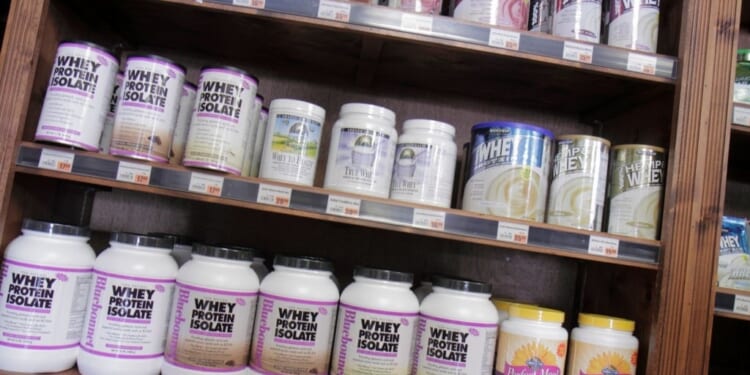It starts with a clean scoop of powder, a swirl of milk or water, maybe a promise of improved health on the label. But what’s really hiding inside might surprise you. You probably don’t expect much danger in your protein shakes, but a new investigation suggests they might not be as harmless as you believe. Consumer Reports found that many popular protein powders and shakes contain concerning amounts of lead.
Protein Shakes and Lead
Consumer Reports put 23 popular protein products to the test, including powders and ready-to-drink shakes made from dairy, beef, and plants, using 0.5 micrograms of lead per serving as its “level of concern.” The results were anything but reassuring, and plant-based powders – the ones often seen as the healthiest choice – turned out to be the biggest offenders. On average, they packed about nine times more lead than dairy-based options and roughly twice as much as those made from beef. It’s an unexpected twist for anyone who thought “plant-based” automatically meant “pure.”
 A few names jumped off the list for all the wrong reasons. Naked Nutrition’s Vegan Mass Gainer and Huel’s Black Edition landed at the top of Consumer Reports’ “avoid” category after showing some of the highest lead levels in the entire study. Brian Ronholm, the organization’s director of food policy, said the results reveal a troubling trend that’s only getting worse.
A few names jumped off the list for all the wrong reasons. Naked Nutrition’s Vegan Mass Gainer and Huel’s Black Edition landed at the top of Consumer Reports’ “avoid” category after showing some of the highest lead levels in the entire study. Brian Ronholm, the organization’s director of food policy, said the results reveal a troubling trend that’s only getting worse.
“Our tests found that toxic heavy metal contamination in protein supplements is widespread and has worsened since we first analyzed these products,” he explained in a press release. Fifteen years after Consumer Reports first began testing the supplement industry, the problem appears to have grown – a sign, Ronholm suggested, that the race to meet booming demand may be outpacing safety.
Most of the plant-based products in the tests had higher lead levels. “Two had so much lead that CR’s experts caution against using them at all,” the report stated. “A single serving of these protein powders contained between 1,200 and 1,600 percent of CR’s level of concern for lead, which is 0.5 micrograms per day. Two others had between 400 and 600 percent of that level per daily serving. CR experts recommend limiting these to once a week.” The report continued:
“The lead levels in plant-based products were, on average, nine times the amount found in those made with dairy proteins like whey, and twice as great as beef-based ones. Dairy-based protein powders and shakes generally had the lowest amounts of lead, but half of the products we tested still had high enough levels of contamination that CR’s experts advise against daily use.”
The companies called out in the report didn’t stay silent for long. Huel said its ingredients go through “rigorous testing.” In a statement to CBS News, Huel’s Head of Nutrition, Rebecca Williams, said its products “fully comply with international food safety regulations” and are “completely safe to consume.” Naked Nutrition offered a similar defense, explaining that its mass gainer formula is meant to be taken in much larger servings than a standard protein powder, which makes direct comparisons unfair. The company added that independent lab results show “no heavy metals exceeding FDA reference limits.”
The Dangers of Lead Exposure
The problem starts long before the powder hits the blender. Lead and other metals are already in the ground, and plants naturally pull them up through their roots. If those crops are grown in polluted soil or watered with contaminated water, the metals don’t just disappear; they travel with the plant. By the time the ingredients are dried, milled, and turned into protein powder, the lead is still there, mixed right in with everything else.
Lead exposure isn’t a minor concern – it’s a serious health hazard. The metal is a powerful neurotoxin that can build up in the body over time, damaging the brain, kidneys, and nervous system. In children, it can slow growth and impair learning and behavior. In adults, it’s been linked to high blood pressure, fertility problems, and memory loss.
The US Food and Drug Administration has long warned that there is no safe level of lead exposure. Consumer Reports took that even further, using a stricter limit of just 0.5 micrograms per day for adults as a precautionary guideline. Those trace numbers may sound small, but daily scoops of protein powder can make them add up fast, especially for people who use supplements as part of their everyday routine.
Part of the problem is how lightly protein powders are regulated. Unlike regular food or medicine, supplements don’t have to be tested or approved by the FDA before they’re sold. The agency usually steps in only after a problem is reported, not before. That means it’s mostly up to the companies themselves to check for heavy metals and make sure their products are safe – something that doesn’t always happen.
This latest report serves as a reminder that not everything marketed as healthy is automatically safe. Protein powders can help people meet fitness goals, but they should be used with awareness and moderation. Checking labels, varying protein sources, and avoiding overuse are simple ways to lower exposure.
“It’s concerning that these results are even worse than the last time we tested,” said Tunde Akinleye, the food safety researcher who led the testing project. “We advise against daily use for most protein powders, since many have high levels of heavy metals and none are necessary to hit your protein goals.”
Lead contamination in protein supplements isn’t a new problem, but the scale is much larger than most people thought. Perhaps it’s time, as Ronholm suggested, for stronger regulation and better transparency. “Consumers deserve to know that the products they use to stay healthy aren’t putting them at risk.”

















